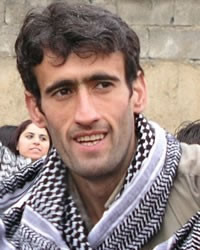The Kurds are one of the largest ethno-linguistic people groups in the world without their own nation. The homeland of the Kurds is in the Middle East, northwestern Iran, southeastern Turkey and the northern sections of Iraq and Syria. After WWII Kurds began to migrate from the violence and turmoil of their native land to countries in the West. Some Northern Kurds now make their home in the USA.
Many live in San Diego and Memphis, TN. Some Kurdish families in the USA now speak English in their homes while others still speak Northern Kurdish, also known as Kurmanji.
The traditional occupation of the Kurds in their homeland was that of nomadic herding of goats and sheep. In the USA, they have had to take on new jobs such as construction, owning restaurants and small businesses or in manufacturing. Kurdish parents encourage their boys and girls to obtain a college education.
Family is an essential part of Kurdish culture. The relationship between family members is close. The clan and community are more important than the individual in traditional Kurdish society. The Kurdish father is the traditional head of the home. Traditionally a Kurdish man and woman in love could not marry without both their families' permission.
Kurdish families in the USA often have more children than the typical American family. American Kurds tend to live in nuclear families while in Kurdistan, the land of the Kurds, they lived in extended families up to four generations under the one roof. Respecting older people is integral part of Kurdish family values. Hospitality and family honor are significant features. Kurdish women and girls were expected to dress modestly or she would dishonor her family. A woman in Kurdistan was not considered an adult unless she was married and had children.
These dynamics are changing due to the individualistic nature of American society. American school systems train young people to be independent. Many young Kurds have started to put their own interests before that of their family and community. It was once unthinkable for an unmarried Kurdish couple to live together as Americans typically do. In the USA a Kurdish woman may pursue a professional career and not marry.
Kurds are trying to preserve their ways and protect Kurdish rights abroad through Kurdish organizations. One of these organizations is dedicated to protecting women's rights. In Minneapolis there is the Kurdish Community of America (KCA) which helps recently arrived Kurds with practical needs like finding housing and getting a driver's license.
About 75% of the Kurds in the world claim to be Sunni Muslims. Smaller Kurdish groups include Shia, Sufi, Christian and Yazidi. Sunni Kurds tend to be more tolerate of other faiths than other Muslims. Sunni Kurds try to obey the teachings of the Koran and the prophet Mohammad. They believe that by following the Five Pillars of Islam that they will attain heaven when they die. However, Allah, the supreme and only God of the universe, determines who enters paradise. Sunnis pray five times a day facing Mecca. They fast the month of Ramadan. They attend mosque services on Friday. If a Muslim has the means, he or she will make a pilgrimage to Mecca once in his or her lifetime. The two main holidays for Sunni Muslims are Eid al Fitr, the breaking of the monthly fast and Eid al Adha, the celebration of Abraham's willingness to sacrifice his son to Allah. The Kurdish New Year on March 21 is celebrated as a major holiday by all Kurds regardless of religion.
The Kurds living in the USA must understand that biblical Christianity is not just a Western religion. They must see that their good works will not gain them the forgiveness of their sins or eternal life. Newly arrived Kurds need to learn English and new job skills in order to fit into their new home.
Pray the Lord leads American believers to build friendships with Kurds and tell them about their Savior.
Pray that God creates a hunger for the Bible and spiritual truth in the heart of the Kurdish people living in the USA.
Ask God to raise up Kurdish disciples who will make more disciples.
Pray that Kurdish leaders are willing to investigate the claims of Jesus Christ.
Scripture Prayers for the Kurd, Kurmanji in United States.
https://search.brave.com/search?q=Kurds+in+America&source=desktop&summary=1&summary_og=8e4a6c5c73a6957620b7ff
https://en.wikipedia.org/wiki/Kurdish_Americans
https://thekurdishproject.org/kurdish-nonprofits/kurdish-community-of-america-kca/
https://www.institutkurde.org/en/kurdorama/
https://www.aljazeera.com/features/2012/10/15/immigrants-thrive-in-us-country-music-capital/
| Profile Source: Joshua Project |











